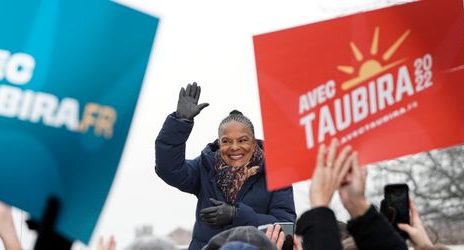
In key areas like immigration and Covid-19 relief, Biden isn’t breaking with Trump’s nationalism. In fact, he’s continuing it.
President Joe Biden’s address to the nation this Wednesday night wasn’t just a victory lap for the accomplishments of his first 100 days: It was a declaration that the Biden administration’s highest ambition would be reviving America and its democracy from the sorry state his predecessor had left it in.
There have been real accomplishments, like the transformative American Rescue Plan. But in key policy areas, even ones where Trump’s approach deeply damaged America’s democratic image, the Biden administration has seemingly been content with continuing its predecessor’s policies. On immigration and the global Covid-19 response in particular, Biden has seemed unable or unwilling to move past Donald Trump’s worldview, giving “America First” a home in a Democratic White House.
In mid-April, the Biden administration announced it would maintain the Trump administration’s 15,000-person cap on refugee admittance — a break with its campaign promise, not to mention a continuation of one of Trump’s most noxious policies.
According to the New York Times, Secretary of State Antony Blinken was in the Oval Office on March 3, “pleading with President Biden” to raise the refugee cap. Here’s how the president responded:
Mr. Biden, already under intense political pressure because of the surge of migrant children at the border with Mexico, was unmoved. The attitude of the president during the meeting, according to one person to whom the conversation was later described, was, essentially: Why are you bothering me with this?
After an intense backlash from congressional Democrats and liberal pundits, the administration reversed itself, saying it would announce a plan to raise the cap by an unspecified number by May 15.
The story on global vaccine distribution is similar.
For weeks after it became clear that the United States would have enough vaccines to meet domestic demand, the Biden administration refused to export its excess to poorer countries. That includes stockpiles of the Oxford/AstraZeneca vaccine, which has still not been approved for use in the United States.
This policy changed in late April, after a direct phone call between Biden and Indian Prime Minister Narendra Modi underscored the country’s desperate straits. But insider reporting, this time from Politico, once again suggests the White House initially overrode the relevant agencies and directly blocked vaccine exports:
Senior officials in the White House and National Security Council had repeatedly rebuffed requests from leaders of health agencies, the State Department and the U.S. Agency for International Development to send doses abroad. The officials backing the exports cited weekly internal projections that showed the U.S. would have tens of millions of doses to spare. Their opponents urged Biden to wait until the U.S. had authorized more shot makers and was further along in its own vaccination campaign.
And there are other areas where Biden has sounded an America First tune. His administration plans to maintain Trump’s tariffs on China indefinitely, according to US Trade Representative Katherine Tai. It has continued the Trump policy of using Title 42, a health code, to kick asylum seekers out of the country. It has refused to share vaccine manufacturing technology with foreign companies and countries, and took weeks to lift a ban on exporting vaccine raw materials that India desperately needed.
To be sure, there have been notable departures from Trump’s isolationist impulses — particularly when it comes to US membership in international organizations and agreements. But it’s fair to say that the Biden administration is going farther down an America First track than many Democrats would like.
Biden’s surprisingly weak record on helping foreigners
The administration’s defense on some of these issues is, more or less, Trump made them do it.
During a briefing, White House press secretary Jen Psaki blamed the refugee screwups on “the decimated refugee admissions program we inherited” that made it difficult to actually bring people into the country. In an interview with the Wall Street Journal, Tai said that “yanking off tariffs” would be impossible without causing economic disruption; there needed to be time for changes to be “communicated in a way so that the actors in the economy can make adjustments.”
These are debatable claims. The New York Times’s account suggests Biden’s disinterest, even independent of administrative capacity, was a major barrier to raising the refugee cap. But nonetheless, there is some truth to them. The Trump administration created bureaucratic and policy obstacles blocking Biden from overturning its policies, including on big-ticket foreign policy issues like the Iran nuclear deal and normalizing relations with Cuba.
And in several areas where there were no constraints, Biden has gone in a more internationalist direction. He rejoined the World Health Organization, eliminated the “Muslim ban,” and reentered the Paris climate agreement.
But these are low-hanging fruit, simple reversals of a handful of especially high-profile and widely criticized Trump policies. On the biggest challenge the global community is facing — the Covid-19 pandemic — the Biden administration’s international efforts have been frustratingly sluggish.
The global south is badly short of vaccines — and current efforts to acquire them, like the Covax purchasing fund, aren’t enough to make up the gap quickly. The Biden administration has been slow to act to address this problem, dragging its feet on exporting excess vaccines and lifting a ban on exporting the raw materials for vaccine manufacturing.
/cdn.vox-cdn.com/uploads/chorus_asset/file/22481093/1232607178.jpg) Diptendu Dutta/AFP/Getty Images
Diptendu Dutta/AFP/Getty ImagesMuch of this action has been a response to India’s current crisis, but there’s also a need for a proactive plan designed to prevent the next major outbreak by ramping up vaccination campaigns in poorer countries. So far, public health experts say the US has been largely absent.
Its $4 billion pledge to Covax is a nice gesture but not up to the task, and it’s not clear exactly how many more vaccines will be forthcoming from American stockpiles. On Friday, National Security Adviser Jake Sullivan said that “the president hasn’t made a determination about sending additional doses” beyond the excess AstraZeneca jabs already pledged.
“He’s avoided any commitments on global vaccination,” says Gregg Gonsalves, an epidemiologist at Yale University. “It’s incomprehensible and baffling.”
Similarly, on immigration, there is no rule forcing Biden to continue using Title 42 to expel asylum seekers. Homeland Security Secretary Alejandro Mayorkas claimed “there’s no intention to use the CDC Title 42 authority for a day longer than the public health imperative requires” — and indeed, the administration is currently considering a humanitarian exemption to the policy.
However, as my colleague Nicole Narea reports, the purported public health rationale for the policy is weaker than the administration suggests. Covid screening of asylum seekers has turned up low positivity rates; creating a broader testing regime that identified Covid-positive individuals would likely be sufficient to contain the risk and would certainly be more humane than sending migrants back to Mexico.
“I think it continues to be clear that the Title 42 travel ban is using a public health rationale for what is an ideological and political [policy],” Michele Heisler, a professor of public health at the University of Michigan, told Narea. “They’re afraid of sending a message that people should come.”
And on trade, Biden has voluntarily extended key Trump protectionist policies, including tariffs on metal imports and an effort to undermine the World Trade Organization’s appellate process. He even added to some of them, signing an executive order tightening “Buy American” rules for the federal government and proposing tax incentives for ordinary citizens to purchase American-made electric cars.
“It’s totally America First,” Dan Drezner, a professor at Tufts University who studies international trade, says of Biden’s policies. “I don’t think they’re more protectionist than Trump per se. But they’re not less either.”
America First, Biden-style
Of course, some degree of national partiality is to be expected in any presidency. Biden was elected by the citizens of the United States, not the world; it’s understandable that he’d give their interests priority.
But in the wake of Trump, who attacked the liberal international order that America helped create, Biden has a special kind of burden — recommitting the United States to creating a world where nations cooperate and care for those outside of their borders. But so far, the administration has seemed surprisingly comfortable with America First-style policies, a degree of nationalism that undermines the “America is back” restoration the Biden team has promised.
It’s not clear why the Biden administration is making these choices. (The administration did not respond to my request for comment.) But some hints may be found in Biden’s Wednesday night speech to Congress, where he sold his new legislative economic priority — the American Jobs Plan — by saying that “all the investments in the American Jobs Plan will be guided by one principle: Buy American.”
Overall, the speech seemed directly pitched at a particular kind of voter: economically distressed blue-collar workers without college degrees, the sort that (in some accounts) powered Trump’s surprise 2016 victory.
/cdn.vox-cdn.com/uploads/chorus_asset/file/22481096/635362308.jpg) Mark Makela/Getty Images
Mark Makela/Getty Images“I know some of you at home are wondering whether these jobs are for you. So many of you, so many of the folks I grew up with, feel left behind, forgotten, in an economy that’s so rapidly changing — it’s frightening,” he says. “Nearly 90 percent of the infrastructure jobs created in the American Jobs Plan do not require a college degree. Seventy-five percent don’t require an associate’s degree. The American Jobs Plan is a blue-collar blueprint to build America.”
It’s not obvious that Biden’s political diagnosis is correct — the weight of the political science evidence suggests that economic circumstances had at best a limited effect on Trump’s rise. Nor is it obvious that Biden’s nationalist policies would actually help these voters: Keeping refugees out and AstraZeneca vaccines in storage would have little effect on their lives, while Trump’s tariffs did demonstrable damage to the American economy.
And what’s undeniable is that this administration’s choices have real-life consequences for people outside America’s borders. Hewing closely to the America First line may or may not be good domestic politics, but it’s almost certainly hurting some of the world’s most vulnerable people.





